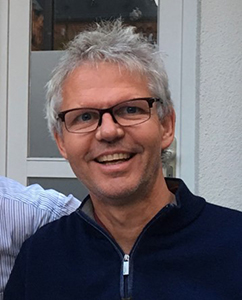Prof. Dr. Ulrich Massing
| Group Leader | ||
 | ||
| Mailing address: | Department of Pharmaceutical Technology and Biopharmacy Hermann-Herder-Str. 9 D-79104 Freiburg i. Br. | |
| Phone: | +49-7641-705-2103 | |
| Email address: | Ulrich Massing | |
| LinkedIn Profile: | Ulrich Massing | |
Research interest
We are an interdisciplinary (and mostly young) team of pharmacists, pharmaceutical scientists as well as chemists focusing on the preparation of smart nanoparticles to improve drug delivery to severely ill patients, mostly suffering from cancer, which is kind of a mission.
Currently, we are working on innovative ways to make the preparation of lipid nanoparticles, mostly liposomes, much easier and faster, which will allow the preparation also in a clinical pharmacy (bedside preparation). Preparation of lipid nanoparticles just prior-use is a way to overcome shelf-life problems, which - till now - have strongly limited the number of clinically approved lipid nanoparticles. The basis for this approach is a new "in-vial-homogenization" technique based on dual centrifugation, which allows liposome preparation in a closed and sterile vial (for details, see here).
Recently, we discovered a completely new type of lipid nanoparticle. These new small multilamellar vesicles turned out to be perfectly suited for entrapping poorly water-soluble drugs, a class most anticancer drugs belong to.
Another topic of the research group is the development of drug-loaded, temperature-sensitive liposomes (TSLs) using a new and innovative group of phospholipids. TSLs are nanoparticles which are stable at body temperature (37 °C), but release their cargo under hyperthermic conditions (41 °C). Patients suffering from sarcomas (soft tissue tumors) can benefit from such a therapy. To this end, tumor tissue is heated up to 41 °C by a variety of techniques. TSLs, while circulating in the blood stream, will then release their cytotoxic cargo while passing the heated tumor tissue, allowing for a higher drug dose in the tumor. Since TSLs are tight at 37 °C, only a reduced amount of drug will reach healthy tissues, efficiently reducing side effects.
Therapeutic agents which will be entrapped into the new lipid nanoparticles are classical anticancer drugs (cytostatics), but also - with a strong focus to the future - targeted drug molecules and nucleic acids, like siRNA or mRNA, CrisperCas9-nucleic acid-protein complexes.
Our research group is part of the Pharmaceutical Technology and closely connected to the other Pharmaceutical Technology groups of Prof. Heerklotz, Prof. Süss, PD Dr. Allmendinger, and Dr. Kaul.
Open Positions
Master, Diploma or Bachelor students
We are always interested in highly motivated Master, Diploma or Bachelor students interested in nanoparticle development for anticancer treatment. Opportunities for Bachelor, Master, and Diploma thesis are subject to availability. Master candidates should have a Bachelor degree or equivalent in the area of Pharmaceutical Sciences, or related biology and chemical sciences. Previous experience in a laboratory setting will be of advantage.
Applicants should always send a CV with all relevant transcripts and a brief statement of interests to Ulrich Massing.
